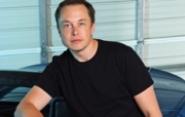Entrepreneurial 'Rock Star' Elon Musk Inspires Young Engineers

10/14/2010
At age 39, Elon Musk has already helped create some of the most widely recognized and transformative companies on the planet, including e-commerce giant PayPal; Tesla Motors, manufacturer of the world’s first production luxury electric vehicle with a mission to accelerate the presence of electric cars by five to ten years; and SpaceX, a private space transport company, which has been contracted by NASA to resupply the International Space Station once the Space Shuttle retires.
On October 14, Musk delivered the inaugural Victor M. Tyler Distinguished Lectureship in Engineering. Made possible through a generous gift from the Honorable Guido and Anne Calabresi and named in honor of Victor M. Tyler—a Yale Engineering graduate and entrepreneur—the lectureship aims to bring to campus leaders whose contributions and insights not only reflect the broad mission of engineering, but also shed light on some of the most important technological problems of our times. With Musk’s extensive entrepreneurial and engineering portfolio, he was a clear choice, according to the faculty and student selection committee.
His talk, entitled, "Making Life Multiplanetary," focused on his work at SpaceX and included videos of the successful launches of the Falcon 1 and Falcon 9 rockets—both designed for maximum reliability. The Falcon 9—named for its nine engine cluster—is an improved version of the engine architecture of the Saturn V and Saturn I rockets of the Apollo 10 program, which had flawless flight records despite losing engines. Contrary to how the NASA space shuttle program has evolved during his lifetime, Musk is committed to making space exploration cheaper, faster, and better—eventually opening up space travel to all.
“If I had been more knowledgeable, we would have gotten to orbit before flight four,” says Musk. But for a company that has been in existence less than 10 years and with a chief rocket designer—Musk—who claims he had never physically built anything before starting SpaceX, it has had remarkable success. In June, SpaceX successfully launched the Falcon 9 and achieved orbit, which Musk says is far more difficult than reaching space. Next year, it will take cargo to the Space Station, and their hope is that soon after that, they will begin transporting astronauts.
Ultimately, Musk believes we should work toward extending life beyond Earth—not because we need to—but instead, because this is the first time in the four billion-year history of life on Earth that it’s been within the realm of possibility.
One may wonder what connection exists between PayPal, Tesla, SpaceX, and Musk’s other entrepreneurial endeavors. As he acknowledges, space travel and cars are probably not the most profitable endeavors, however, they don’t need to be to fit into Musk’s vision. It’s not the economics, nor is it a level of “fun” that drives Musk. Instead, it is his response to “what are the things that would most affect the future of humanity?” For Musk, this was the internet, sustainable energy, and space exploration.
There is perhaps no better description of the essence of engineering than one’s passion to impact the future of humanity and that is what this lecture series is about says Kyle Vanderlick, Dean of the School of Engineering & Applied Science.

